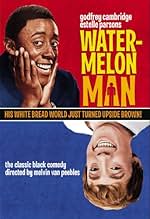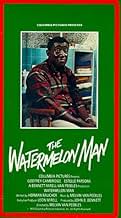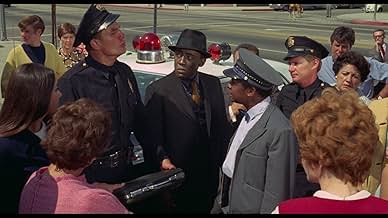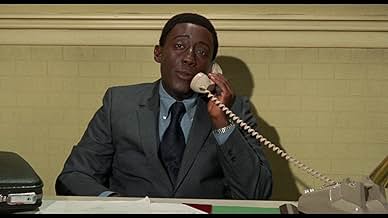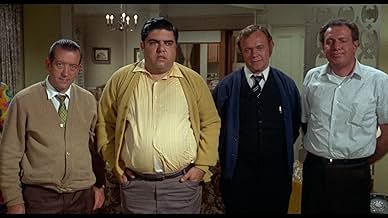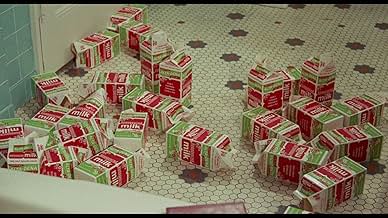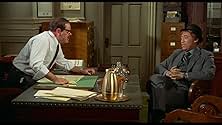IMDb RATING
6.7/10
3.2K
YOUR RATING
Jeff Gerber, a racist white man, wakes up one morning to discover that he has become black.Jeff Gerber, a racist white man, wakes up one morning to discover that he has become black.Jeff Gerber, a racist white man, wakes up one morning to discover that he has become black.
- Nominated for 1 BAFTA Award
- 1 win & 1 nomination total
Paul Williams
- Employment Office Clerk
- (as Paul H. Williams)
- Director
- Writer
- All cast & crew
- Production, box office & more at IMDbPro
Featured reviews
I'd only seen "Watermelon Man" on late nite TV as a kid, obviously cut to hell, but the film always fascinated and disturbed me. I haven't seen it in literally 20 years yet I remember very specific scenes, particularly the amazing militant final scene. I finally picked up the beautiful DVD and my memory was correct. The movie is awkward in spots, but there's a vitality that pushes against the old-school studio vibe. And it still holds up as funny in many scenes. I like some of Peebles music cues although they are sometimes not apropos. There are some strong scenes dealing with suburban racial tensions and Godfrey Cambridge is terrific as he changes from a white bigot to a black man. The movie isn't as one-sided as some might think. One of my favorite films of the 70's. Check it out.
In Watermelon Man, director Melvin Van Peebles expresses complex ideas about race and racism in a sophisticated but humorous way. At that, however, if you do not have a strong taste for grotesques--in a formal sense ("outlandish or bizarre; ludicrous or incongruous distortion")--you may not enjoy the film as much as I did. It is something of a surreal, occasionally psychedelic caricature, but as such, it does what all good caricature should do--it emphasizes the truth without being strict realism or "naturalism".
Watermelon Man is the story of Jeff Gerber (Godfrey Cambridge). He's something of a strange dweeb who nevertheless has a stereotypical white-bread suburban existence. He's got a wife, two preadolescent kids, a nice home with a manicured lawn, and so on. He's also something of a health nut (although humorously, Cambridge wasn't exactly in great shape when they shot the film). As the film opens, he's busy exercising while his wife is trying to capture a few more minutes of sleep. He regularly uses a sun lamp. He takes the bus to his insurance salesman job, but instead of catching it right down the street, he races it through the neighborhood every day, the goal being to beat it to the last stop before it gets on the highway.
Jeff presents himself as happy-go-lucky and quite a joker, but he's a bit obnoxious and boorish, plus he shows himself to be racist and a male chauvinist, although he's not exactly gung ho about sleeping with his wife.
Just as we're learning about Jeff's routine, something unusual happens--he wakes up in the middle of the night as a black man. At first he thinks it's a nightmare, but it doesn't go away. He blames it on the sun lamp. He blames it on food he's ingesting. The bulk of Watermelon Man has Jeff trying to at first conquer, then later deal with his newfound "problem".
If you've seen both films, you might find it odd that Van Peebles made Watermelon Man before Sweet Sweetback's Baadasssss Song (1971). Unlike Sweet Sweetback, which is intriguing in its own way, but not near as good of a film artistically and technically, the direction in Watermelon Man is finely nuanced and sophisticated, the cinematography is crisp and attractive and technical elements such as sound are superb. I suppose this might be an interesting lesson in how crucial budget and "legitimacy" can be for film-making. It gives access to the finest materials and resources, including a large stable of professionals with narrow specialties. At that, however, Watermelon Man is not nearly as respected now as Sweet Sweetback because of what Sweet Sweetback represents, both ideologically and influentially in the film industry. Sweet Sweetback was something of a revolutionary (and very psychedelic) cry for African-American rights, and it helped launch not only the blaxploitation craze of the 1970s, but also fiercely independent film-making.
Yet, Watermelon Man is just as unique and important in what it has to say about race, even if it's not violent or pornographic, and not bizarre in the same way. Once Jeff becomes black, everything about his life changes. There isn't a person around who doesn't relate to him differently, with many having a polar opposite reaction to him--both his white friends (and family, of course) and his black acquaintances (they weren't friends, exactly, when Jeff thought he was white). Everyone wants to exploit his newfound state, including his boss. Van Peebles makes a sly transition from the beginning to the end of the film that goes from white-bread sitcom to something of a militant blaxploitation flick in a way that you barely even notice.
A large part of what makes Watermelon Man so odd is Godfrey Cambridge. His performance is way over the top and consistently bizarre, but for some of us, in some contexts (such as for me in this context), this kind of bizarre, over the top material works extremely well--in fact, I tend to prefer this to realism. The other performances are at least interesting, even if they're not all good in a conventional wisdom evaluation, but Cambridge really carries the film.
Equally bizarre and a bit disturbing is Cambridge's make-up as a white man. The make-up is extremely well done--it's difficult to picture Cambridge as he really looks underneath it all, but given the character's disposition, Cambridge as a white man comes off as freakish to say the least.
Van Peebles' direction is extremely admirable. He's not afraid to take all kinds of thrilling chances, including such unusual moves as quick pans to go from character to character in a conversation and odd intrusions of psychedelia, such as the scene that suddenly starts flashing different negative exposure images, or the scene that stops to insert commentary that resembles silent film intertitles.
Van Peebles also did the music here, as he did in Sweet Sweetback, and it's just as weird. Near the end of the film, there's an extended version of a song that rips-off "Heard It Through The Grapevine" that features a vocal that even The Residents would raise an eyebrow to. Again, I love weird stuff, so I was happier than a pig in, um, mud.
If there's anything less than satisfactory about Watermelon Man, it's that it engenders sadness that Van Peebles wasn't able to talk the helm more often. He made a controversial move in this film by changing the ending in the original script, as he rightfully should have done (Columbia originally wanted an "it was all a dream" ending, which would have been ridiculous and insulting, to say the least), and that, combined with his independent production of Sweet Sweetback the following year, didn't exactly put him on Hollywood's successful brownnoser list.
Watermelon Man is the story of Jeff Gerber (Godfrey Cambridge). He's something of a strange dweeb who nevertheless has a stereotypical white-bread suburban existence. He's got a wife, two preadolescent kids, a nice home with a manicured lawn, and so on. He's also something of a health nut (although humorously, Cambridge wasn't exactly in great shape when they shot the film). As the film opens, he's busy exercising while his wife is trying to capture a few more minutes of sleep. He regularly uses a sun lamp. He takes the bus to his insurance salesman job, but instead of catching it right down the street, he races it through the neighborhood every day, the goal being to beat it to the last stop before it gets on the highway.
Jeff presents himself as happy-go-lucky and quite a joker, but he's a bit obnoxious and boorish, plus he shows himself to be racist and a male chauvinist, although he's not exactly gung ho about sleeping with his wife.
Just as we're learning about Jeff's routine, something unusual happens--he wakes up in the middle of the night as a black man. At first he thinks it's a nightmare, but it doesn't go away. He blames it on the sun lamp. He blames it on food he's ingesting. The bulk of Watermelon Man has Jeff trying to at first conquer, then later deal with his newfound "problem".
If you've seen both films, you might find it odd that Van Peebles made Watermelon Man before Sweet Sweetback's Baadasssss Song (1971). Unlike Sweet Sweetback, which is intriguing in its own way, but not near as good of a film artistically and technically, the direction in Watermelon Man is finely nuanced and sophisticated, the cinematography is crisp and attractive and technical elements such as sound are superb. I suppose this might be an interesting lesson in how crucial budget and "legitimacy" can be for film-making. It gives access to the finest materials and resources, including a large stable of professionals with narrow specialties. At that, however, Watermelon Man is not nearly as respected now as Sweet Sweetback because of what Sweet Sweetback represents, both ideologically and influentially in the film industry. Sweet Sweetback was something of a revolutionary (and very psychedelic) cry for African-American rights, and it helped launch not only the blaxploitation craze of the 1970s, but also fiercely independent film-making.
Yet, Watermelon Man is just as unique and important in what it has to say about race, even if it's not violent or pornographic, and not bizarre in the same way. Once Jeff becomes black, everything about his life changes. There isn't a person around who doesn't relate to him differently, with many having a polar opposite reaction to him--both his white friends (and family, of course) and his black acquaintances (they weren't friends, exactly, when Jeff thought he was white). Everyone wants to exploit his newfound state, including his boss. Van Peebles makes a sly transition from the beginning to the end of the film that goes from white-bread sitcom to something of a militant blaxploitation flick in a way that you barely even notice.
A large part of what makes Watermelon Man so odd is Godfrey Cambridge. His performance is way over the top and consistently bizarre, but for some of us, in some contexts (such as for me in this context), this kind of bizarre, over the top material works extremely well--in fact, I tend to prefer this to realism. The other performances are at least interesting, even if they're not all good in a conventional wisdom evaluation, but Cambridge really carries the film.
Equally bizarre and a bit disturbing is Cambridge's make-up as a white man. The make-up is extremely well done--it's difficult to picture Cambridge as he really looks underneath it all, but given the character's disposition, Cambridge as a white man comes off as freakish to say the least.
Van Peebles' direction is extremely admirable. He's not afraid to take all kinds of thrilling chances, including such unusual moves as quick pans to go from character to character in a conversation and odd intrusions of psychedelia, such as the scene that suddenly starts flashing different negative exposure images, or the scene that stops to insert commentary that resembles silent film intertitles.
Van Peebles also did the music here, as he did in Sweet Sweetback, and it's just as weird. Near the end of the film, there's an extended version of a song that rips-off "Heard It Through The Grapevine" that features a vocal that even The Residents would raise an eyebrow to. Again, I love weird stuff, so I was happier than a pig in, um, mud.
If there's anything less than satisfactory about Watermelon Man, it's that it engenders sadness that Van Peebles wasn't able to talk the helm more often. He made a controversial move in this film by changing the ending in the original script, as he rightfully should have done (Columbia originally wanted an "it was all a dream" ending, which would have been ridiculous and insulting, to say the least), and that, combined with his independent production of Sweet Sweetback the following year, didn't exactly put him on Hollywood's successful brownnoser list.
I just rented this DVD and loved it. At first, Godfrey Cambridge was a bit shrill for my taste but I got over it. His comic timing and acting was awesome. The humor was as sharp and cutting as a blade. Like in Sweet Sweetback..., Melvin Van Peebles doesn't go for the obvious commentary on race relations; I loved the scene at the end when the wife admits that she's "liberal to a point." People of color have hit this invisible and unexpected brick wall at one point or another with some liberals. Some of the production value and jagged editing notwithstanding, I was riveted by this film. It's sad how, over 30 years later, how timely it still is in a lot of ways. While I would love us all to get along, I appreciate the honesty and realness the film depicts of what happens when getting along is made impossible when one group dehumanizes another. Melvin Van Peebles does not shy away from showing this, nor does he apologize for or explain it. The film made me re-appreciate him as a real auteur, an adroit storyteller. Damn Van Peebles is good!
Somewhat unevenly charts the journey of a successful, loud and bigoted insurance salesman's transition from loathed go-getter to loathed gone-goner. The early twist in the tale, allows an opportunity to see a strong central character face a new challenge. However, sadly, the storyline passes up the chance to see a fighter fighting and the direction becomes bogged down in a realisation that Gerber is beaten from the very moment he is plunged into what the film perceives as an underclass. A particular shame, therefore, as it declares race crossover to be a sentence as opposed to an alternative - there is no real optimism afforded to Gerber after the key white/black event and the film might have been stronger with such an exploration.
The film can be disturbing; but with slick,in your face, stateside put-downs 'The Watermelon Man' certainly enters a sensitive subject area head-first and allows the viewer to make an early judgement.
Whilst the storyline delivers meagre reward in terms of development, there is enough here to warrant a recommendation. Cambridge is outstanding as the hounder who becomes the hounded and the spine of the film is its humour bordering on the cheap for sure, but funny, often hilarious and providing the piece with an underlying energy. Racing the bus to work on foot, crudely separating the mugs from their money, learning to take hate on the chin its all here.
The strength of the final ceremony/scene smacks of eventual acceptance, a sense of belonging and possibly a new way forward; this will shock many as it is bitter-sweet, turning laughter into cold realism. Perhaps Van Peebles was taking the easy option? I think a sequel would have been a fitting reward.
I rate it highly, even after considering its faults.
*********************************************************
UPDATED REVIEW: Today is 1 March 2005 and, courtesy of USPS, Amazon/Lasercorner.com and Travel Inn West 42nd St, NYC (long story ), I have now received the DVD of this film. I first saw it in the early 1980's and have been raving on about it ever since, saying to anybody that wanted to listen, that it was hysterically funny. It still cannot be purchased directly in England.
So today I watched it again, in the new high definition print. I want to amend my original review
The film made me feel guilty about how much I laughed when I first saw it. Yes, it still has great comic moments but there is so much more to it. Scene 11 'property values', sees Jeff Gerber's formerly pleasant neighbours confront him at home and they offer him $100,000 for him to move out of the area. This scene made me feel sickened. Firstly because it shows just how bad the racial situation was in America (surely it has improved since then??) and secondly because, on the first viewing all those years ago, I just didn't "get it" I saw an overall humour, where I should have seen the out and out bigotry, ignorance and sadness. After this pivotal scene Gerber tells his boss to stick his job and he moves on to get his own insurance business, settle into a community that he likes, reforms a long-distance dialogue with his blinkered wife and simply get on with being Jeff Gerber. In that respect my original review is seriously flawed as he is not completely beaten by race crossover at all in fact he makes it work for him and a lot of positives come out in the final analysis. It uplifted me.
Hey, enough of the deepness! It is still a great film to own, share and talk about, even after its flaws are considered. I just felt that I hadn't appreciated the finer points of it until now, many years later.
The film can be disturbing; but with slick,in your face, stateside put-downs 'The Watermelon Man' certainly enters a sensitive subject area head-first and allows the viewer to make an early judgement.
Whilst the storyline delivers meagre reward in terms of development, there is enough here to warrant a recommendation. Cambridge is outstanding as the hounder who becomes the hounded and the spine of the film is its humour bordering on the cheap for sure, but funny, often hilarious and providing the piece with an underlying energy. Racing the bus to work on foot, crudely separating the mugs from their money, learning to take hate on the chin its all here.
The strength of the final ceremony/scene smacks of eventual acceptance, a sense of belonging and possibly a new way forward; this will shock many as it is bitter-sweet, turning laughter into cold realism. Perhaps Van Peebles was taking the easy option? I think a sequel would have been a fitting reward.
I rate it highly, even after considering its faults.
*********************************************************
UPDATED REVIEW: Today is 1 March 2005 and, courtesy of USPS, Amazon/Lasercorner.com and Travel Inn West 42nd St, NYC (long story ), I have now received the DVD of this film. I first saw it in the early 1980's and have been raving on about it ever since, saying to anybody that wanted to listen, that it was hysterically funny. It still cannot be purchased directly in England.
So today I watched it again, in the new high definition print. I want to amend my original review
The film made me feel guilty about how much I laughed when I first saw it. Yes, it still has great comic moments but there is so much more to it. Scene 11 'property values', sees Jeff Gerber's formerly pleasant neighbours confront him at home and they offer him $100,000 for him to move out of the area. This scene made me feel sickened. Firstly because it shows just how bad the racial situation was in America (surely it has improved since then??) and secondly because, on the first viewing all those years ago, I just didn't "get it" I saw an overall humour, where I should have seen the out and out bigotry, ignorance and sadness. After this pivotal scene Gerber tells his boss to stick his job and he moves on to get his own insurance business, settle into a community that he likes, reforms a long-distance dialogue with his blinkered wife and simply get on with being Jeff Gerber. In that respect my original review is seriously flawed as he is not completely beaten by race crossover at all in fact he makes it work for him and a lot of positives come out in the final analysis. It uplifted me.
Hey, enough of the deepness! It is still a great film to own, share and talk about, even after its flaws are considered. I just felt that I hadn't appreciated the finer points of it until now, many years later.
"Watermelon Man" might throw off quite a few people with its style of cinema. It's a work of the grandfather of American independent film, Melvin Van Peebles, and with that should come a certain measure of respect. Van Peebles may not have produced dozens of films, but he certainly turned the industry on its head 30 years ago. This is an interesting arrangement on the business side- hot off the European success of "The Story Of A Three Day Pass", Warner Brothers takes on filmmaker Van Peebles for a feature film. The story of Van Peebles versus the company in filming is a conte in itself, but the film remains poignant and striking in its cinematography and theme. Aggressive editing of both film and musical inserts highlight the subtle comedy and pure desperation of the story of a bigot who wakes up Black and watches the world turn against him.
It's something of a manic ride, but Cambridge gives it all the human character it can stand. His antagonist-cum-protagonist role gives you 360 degrees of frustration and forced humility. Van Peebles presses the more unreal moments into a sub-psychedelic form. Printed messages, color fills, choppy eye-effecting shots and that insistent score remind you that this absurdity is all too real. But ongoing themes such as "He stole something.. we don't know what yet," are darkly hilarious as is Cambridge's sharp wit.
"Watermelon Man" is serious film that will still make you laugh at times. This is not the kick-in-the-establishment-a** that "Sweetback" is, but it's an important step on the way. Alongside films such as "Cotton Comes To Harlem" (also with the superb Cambridge) and "Putney Swope," this is an important part of the early end of the Black film explosion.
Look for cameos by songwriter-actor Paul Williams as an employer and Melvin Van Peebles himself as a painter. Black cast staple (and director of "Dolemite") D'Urville Martin is also on hand as a bus driver in some of the film's funniest scenes.
It's something of a manic ride, but Cambridge gives it all the human character it can stand. His antagonist-cum-protagonist role gives you 360 degrees of frustration and forced humility. Van Peebles presses the more unreal moments into a sub-psychedelic form. Printed messages, color fills, choppy eye-effecting shots and that insistent score remind you that this absurdity is all too real. But ongoing themes such as "He stole something.. we don't know what yet," are darkly hilarious as is Cambridge's sharp wit.
"Watermelon Man" is serious film that will still make you laugh at times. This is not the kick-in-the-establishment-a** that "Sweetback" is, but it's an important step on the way. Alongside films such as "Cotton Comes To Harlem" (also with the superb Cambridge) and "Putney Swope," this is an important part of the early end of the Black film explosion.
Look for cameos by songwriter-actor Paul Williams as an employer and Melvin Van Peebles himself as a painter. Black cast staple (and director of "Dolemite") D'Urville Martin is also on hand as a bus driver in some of the film's funniest scenes.
Did you know
- TriviaMelvin Van Peebles: The artist who letters Jeff Gerber's new office door.
- GoofsDr. Wainwright asks Jeff if he knows that the first man to die in an American war was Crispus Atticus. The man's name was actually Crispus Attucks, NOT Atticus. The doctor puts in an extra syllable.
- Quotes
Delivery Man: That guy needs a sun lamp like Fred Astaire needs dancing lessons.
- ConnectionsFeatured in The Real Deal: What It is (2003)
- SoundtracksLove, That's America
Written and performed by Melvin Van Peebles
- How long is Watermelon Man?Powered by Alexa
Details
- Release date
- Country of origin
- Language
- Also known as
- The Night the Sun Came Out
- Filming locations
- Burbank, California, USA(Studio)
- Production companies
- See more company credits at IMDbPro
Box office
- Budget
- $1,000,000 (estimated)
- Runtime
- 1h 40m(100 min)
- Sound mix
- Aspect ratio
- 1.85 : 1
Contribute to this page
Suggest an edit or add missing content


